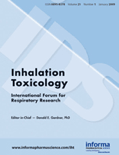
INHALATION TOXICOLOGY
Scope & Guideline
Bridging Science and Health through Inhalation Studies.
Introduction
Aims and Scopes
- Health Effects of Inhaled Substances:
The journal emphasizes research on the health impacts of inhaled toxicants, including particulate matter, gases, and vapors, across different populations and environments. - Mechanistic Studies:
Research that investigates the biological mechanisms through which inhaled substances exert their toxic effects, including studies on cellular responses, signaling pathways, and genetic alterations. - Risk Assessment and Modeling:
The journal publishes studies that develop and apply risk assessment methodologies, including exposure modeling and toxicological evaluations, to understand inhalation risks from various sources. - Environmental and Occupational Health:
Focus on the impacts of inhalation exposure in occupational settings and environmental contexts, including studies on specific populations such as workers in high-risk industries. - Innovative Exposure Systems and Methodologies:
Research on the development and validation of novel experimental models and exposure systems for studying inhalation toxicity, including in vitro and in vivo methodologies.
Trending and Emerging
- Impact of Air Pollution on Vulnerable Populations:
A growing focus on the health effects of air pollution in marginalized communities underscores the need for equity in environmental health research. - Neurotoxicity and Inhalation Exposures:
Recent studies increasingly address the neurotoxic effects of inhaled substances, linking respiratory health to neurological outcomes, which is a burgeoning area of concern. - Multi-Exposure Scenarios:
Research is trending towards understanding the effects of combined exposures to multiple pollutants, including interactions between environmental and occupational exposures. - Innovative In Vitro Models:
There is an increase in the use of advanced in vitro exposure systems that mimic human inhalation, allowing for more precise studies of toxicological mechanisms. - Climate Change and Air Quality:
The intersection of climate change and air quality is emerging as a critical area, with studies examining how climate-related factors influence inhalation exposure and health outcomes.
Declining or Waning
- Traditional Chemical Warfare Agents:
Research on traditional chemical warfare agents has decreased, possibly due to shifting attention towards newer forms of exposure and the health impacts of emerging pollutants. - Single Agent Toxicity Studies:
There is a noticeable reduction in studies focusing solely on single-agent toxicity, as the field increasingly emphasizes the cumulative effects of multiple exposures and complex mixtures. - Historical Exposure Studies:
Investigations into historical exposure events (e.g., specific past industrial accidents) are less frequent, indicating a potential shift towards contemporary and relevant exposure scenarios.
Similar Journals

Toxicology Research
Unveiling the complexities of toxic substances.Toxicology Research is a distinguished journal dedicated to advancing the field of toxicology through the dissemination of high-quality research. Published by Oxford University Press, this UK-based journal focuses on critical aspects of toxicology and mutagenesis, highlighting both environmental and pharmacological implications. With an ISSN of 2045-452X and an E-ISSN of 2045-4538, it serves as a valuable resource for researchers, professionals, and students alike. Currently categorized in the Q3 quartile for Health, Toxicology and Mutagenesis, as well as Toxicology in 2023, Toxicology Research maintains a visible presence in Scopus rankings, positioning itself within the targeted professional community. Although the journal operates without open access options, its importance in contributing to scientific discussions and policy formation is undeniable. Covering content from 2012 to 2024, it continues to provide insights into contemporary toxicological challenges, thereby fostering interdisciplinary collaborations and informing best practices in health and safety.

Exposure and Health
Bridging disciplines for a healthier, safer world.Exposure and Health is a pioneering journal published by Springer, specializing in the interdisciplinary fields of health, toxicology, and environmental sciences. With an ISSN of 2451-9766 and E-ISSN of 2451-9685, this open-access journal exemplifies a commitment to disseminating high-quality research that informs public health practices and policies globally. Situated in the Netherlands, it boasts an impressive impact factor and ranks in the top quartile (Q1) across multiple categories in the 2023 Scopus rankings, including Health, Toxicology and Mutagenesis, Pollution, and Water Science and Technology. The journal is dedicated to advancing knowledge on the interactions between environmental factors and health outcomes, making it a vital resource for researchers, professionals, and students in these critical fields. Exposure and Health actively encourages submissions that address the challenges of exposure assessment, risk management, and the promotion of sustainable public health initiatives.
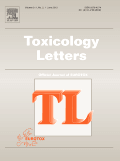
TOXICOLOGY LETTERS
Illuminating the path to safer chemical practices.TOXICOLOGY LETTERS is a prominent journal dedicated to advancing the field of toxicology, providing a platform for high-quality research and reviews that explore the effects of chemical substances on biological systems. Published by Elsevier Ireland Ltd, this peer-reviewed journal has established itself as a vital resource in toxicological research since its inception in 1977, with a convergence of studies extending to 2024. With an impressive Scopus ranking, positioned at #28 out of 133 in the Toxicology category, TOXICOLOGY LETTERS garners a respectable percentile of 79, highlighting its significance in the academic community. Although it is not an open-access journal, its research is accessible through institutional subscriptions, ensuring that critical insights into human health and environmental safety are disseminated effectively. Being categorized in the Q2 quartile in both Medicine (miscellaneous) and Toxicology for 2023 further emphasizes its relevance and impact in these fields. This journal aims to foster collaboration between researchers and professionals, encouraging the exploration of innovative solutions to chemical hazards and the promotion of safer practices in pharmacology and toxicology.
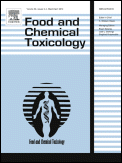
FOOD AND CHEMICAL TOXICOLOGY
Exploring the critical links between food safety and public health.FOOD AND CHEMICAL TOXICOLOGY, published by Pergamon-Elsevier Science Ltd, is a prestigious journal with a significant impact in the fields of food science, medicine, and toxicology, reflecting its Q1 and Q2 quartile rankings in various categories as of 2023. Established in 1982, this journal continues to serve as an essential platform for disseminating high-quality research focused on the toxicological assessment of foods and chemicals, aiming to advance knowledge that affects public health and safety. With a pivotal role in integrating diverse disciplines, including pharmacology and agricultural sciences, the journal ranks impressively within the top percentiles—specifically 95th in Toxicology and 92nd in Food Science on the Scopus metrics. Though it operates on a traditional subscription model, the journal is committed to providing valuable insights and findings to researchers, professionals, and students across the globe, making it a vital resource in the ongoing discourse around food safety and environmental health. Its comprehensive scope underscores its importance in shaping evidence-based policies and practices.

BULLETIN OF ENVIRONMENTAL CONTAMINATION AND TOXICOLOGY
Exploring the nexus of contamination and public safety.BULLETIN OF ENVIRONMENTAL CONTAMINATION AND TOXICOLOGY, published by SPRINGER, is a pivotal journal in the fields of Environmental Science, Toxicology, and Public Health. With a strong history of dissemination since its inception in 1966, the journal predominantly focuses on the latest advances in understanding environmental contaminants and their toxicological effects on health and ecosystems. It currently holds a respectable Q2 ranking across multiple categories including Health, Toxicology and Mutagenesis, Medicine (miscellaneous), and Pollution, as per the 2023 metrics. While the journal is not Open Access, it provides an invaluable platform for researchers, professionals, and students seeking to contribute to and stay informed on critical issues regarding environmental hazards and their implications. With an engaged community of scholars and practitioners, this journal continues to be an essential resource for addressing the pressing challenges of environmental contamination and its health impacts, guiding future research and policy decisions.
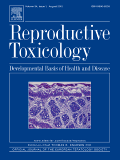
REPRODUCTIVE TOXICOLOGY
Illuminating the effects of toxicants on reproductive systems.REPRODUCTIVE TOXICOLOGY, published by Pergamon-Elsevier Science Ltd, stands as a pivotal journal in the field of toxicology, specifically focusing on the effects of environmental and pharmaceutical agents on reproductive health. Established in 1987, the journal has a rich history of contributing to the scientific community, and it continues to publish rigorous research and reviews that illuminate the intricate relationships between various toxicants and their reproductive impacts. With an impressive 2023 Q2 ranking in Toxicology and a Scopus ranking of #42 out of 133 in the Toxicology category, REPRODUCTIVE TOXICOLOGY emphasizes high-quality scholarly work that influences both academia and industry practices. Researchers, professionals, and students in toxicology, pharmacology, and public health will find this journal an invaluable resource for staying informed on the latest findings and methodologies in reproductive toxicology. While the journal currently adheres to traditional publishing models without open access options, its authoritative content remains accessible to a global audience interested in advancing the understanding of toxicological impacts on reproduction.

Molecular & Cellular Toxicology
Advancing the understanding of toxicological impacts at the cellular level.Molecular & Cellular Toxicology, published by the Korean Society Toxicogenomics & Toxicoproteomics (KSTT), is a significant journal in the field of toxicology, providing crucial insights into molecular mechanisms underlying toxic responses. With an ISSN of 1738-642X and E-ISSN 2092-8467, this journal serves as a vital platform for researchers, professionals, and students interested in the latest findings and advancements in toxicology, health, and environmental science. Although it operates under a subscription model, it maintains rigorous peer review standards, contributing to its respectable Q3 classification in Health, Toxicology and Mutagenesis, and its Q2 standing in Pharmacology, Toxicology, and Pharmaceutics. The journal, intersecting with innovative aspects of pharmacology and public health, aims to foster a deeper understanding of toxicological impacts on cellular processes and overall health. Located in Germany and supported by a dedicated editorial board, Molecular & Cellular Toxicology stands out in the academic community, encouraging interdisciplinary discourse and collaboration to address critical toxicological challenges. Engage with us for cutting-edge research that informs and shapes the future of toxicological science.

Frontiers in Toxicology
Connecting Researchers to the Heart of ToxicologyFrontiers in Toxicology, published by Frontiers Media SA, is a prominent open-access journal dedicated to advancing the understanding of toxicological science. Established in 2019, it serves as a vital forum for innovative research, offering insights into the pharmacological impacts and toxicological profiles of various substances. With its international reach based in Switzerland, this journal has quickly ascended in the academic community, achieving a notable Q1 ranking in Pharmacology, Toxicology and Pharmaceutics (Miscellaneous) and a Q2 ranking in Toxicology as of 2023. The journal is indexed in Scopus, where it ranks #8 out of 43 in its primary category, underscoring its influence and relevance in the field. The scope encompasses cutting-edge studies on the mechanisms of toxicity, including both human and environmental impacts, making it an essential resource for researchers, professionals, and students alike. By promoting open access to high-quality research, Frontiers in Toxicology plays a crucial role in enhancing knowledge sharing and fostering collaboration across disciplines.
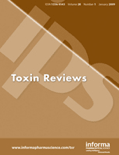
Toxin Reviews
Advancing the Science of ToxicologyToxin Reviews is a premier academic journal focused on the critical field of Toxicology, published by Taylor & Francis Inc. Established with an aim to foster research and disseminate knowledge, this journal has been pivotal since its inception in 1982 and continues to be a leading platform for both emerging and established researchers. With an impressive impact factor and ranked in the 75th percentile among its peers in the Scopus categories, it serves as an essential resource for scientists, practitioners, and students interested in understanding the complexities of toxins and their effects on health. The journal provides an Open Access platform, enhancing visibility and accessibility of research findings to a broader audience. Covering a wide scope, Toxin Reviews plays a vital role in bridging gaps between toxicological research and practical applications, ensuring that rigorous scientific inquiry translates into real-world solutions.
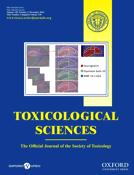
TOXICOLOGICAL SCIENCES
Exploring the Frontiers of Toxicology and Public HealthTOXICOLOGICAL SCIENCES, published by Oxford University Press, is a premier journal in the field of toxicology that has been a cornerstone of scientific discourse since its inception in 1981. With an impressive 2023 impact factor and ranked in the Q1 category for Toxicology, this journal is highly regarded among researchers, professionals, and students dedicated to pharmacology and toxicology. The journal is committed to advancing the understanding of toxicological science, covering a breadth of topics that include the mechanisms of toxicity, risk assessment, and the regulatory aspects affecting public health. With an ISSN of 1096-6080 and an E-ISSN of 1096-0929, TOXICOLOGICAL SCIENCES facilitates open access scholarly work, ensuring that critical research reaches a global audience and promotes collaborative learning. As it converges towards 2024, the journal remains pivotal in shaping the future of toxicology research, providing insights that are essential for developing safer chemicals and protecting environmental health.